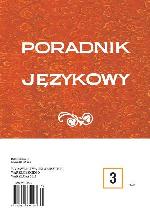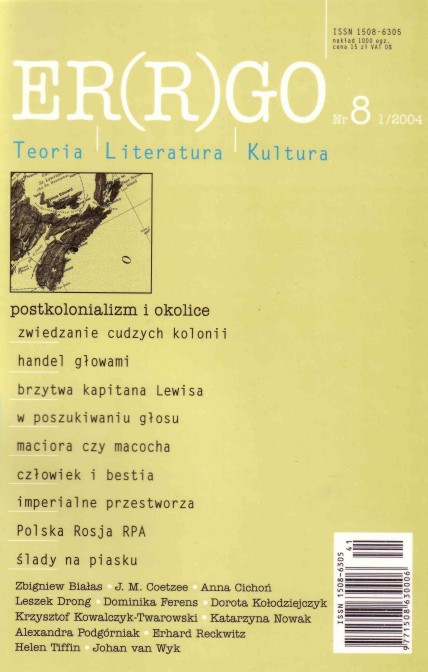



On the basis of chosen travel narratives (mainly Alexander von Humboldt's "Personal Narrative of Travels to the Equinoctial Regions of the New Continent During the Years 1799 – 1804 and The Journals of the Lewis and Clark Expedition") the author anatomises the somatics of travel writing, looks into textual and extra-textual evidence and argues, remembering the etymology of the word "e/motion," that – compulsive travelling is a "moving" manifestation of death-wish.
More...

In the eighteenth, nineteenth and the twentieth century "head trading" i.e., literal and metaphorical hunting for heads existed in numerous colonial contexts. At the close of the nineteenth century Borneo especially started to symbolise wildness of nature. Writing of Dayaks Europeans used (and sometimes questioned) existing stereotypes concerning head hunters. Carl Bock differs from other writers of that period because he makes an equation between head-hunting and cannibalism. On the other hand, Harriette McDougall, Spenser St. John, Alfred Russell Wallace, William Hornaday and A. C. Haddon minimise or negate that equation, stressing the civilised features of the Dayaks. The above-mentioned writers reflect to a certain extent European sentiments towards "civilisation" and "wildness" prevalent at the end of the nineteenth century, of which the best example can be found in Joseph Conrad's works where convenient attitudes are radically revalued.
More...

The article aims to analyze the significance of spatial categories in postcolonialism. Dorota Kołodziejczyk puts forth a thesis that the characteristic spatial anxiety of postcolonial studies (visible e.g. in the inspirations from Foucault and Guattari and Deleuze) locates this discipline firmly in new theories of cultural globalization. She argues that postcolonial studies aims to replace the dominant logic of temporality founding the concept of modernity with the concept of subjectivity as heterotopia – a place where a range of different, often incompatible and alien spaces come together. Postcolonialism, since its inception sensitive to the problem of cultural and national borders, and the borders of belonging, rests on the premise common to its varied trends, namely that each form of identity is local, interactive and dynamic. Kołodziejczyk examines the postcolonial spatial categories arguing that this is in the explorations of the local and the global flows and the tension between them that postcolonialism has a chance to contribute to the theorization of globalization more complex and productive than that stemming from former development studies. It has also a chance to break away from the now exhausted paradigms of (post)colonial/ metropolitan manichean dichotomies. The conclusion is that this new spatial imagination unique to postcolonial theory and literature develops a vision of a new cosmopolitanism, which Homi Bhabha expresses as ‘our sense of mutuality in the conditions of mutability’.
More...

In Coetzee's story, Elizabeth Costello, an Australian writer, boards an ocean-liner to entertain its passengers by giving talks about literature. Her fellow-entertainer is Emmanuel Egudu, a Nigerian writer lecturing on "The Novel in Africa". In his talk Egudu emphasises his Africanness, a special African identity. In conversation, the two characters discuss the novel in Africa; Elizabeth opines that what distinguishes the African novel is that it is not written for Africans but for foreigners. That fact imposes both restrictions and obligations on the African writer, which Coetzee's story illustrates and explores. What it also exposes is the naivety involved in drawing precipitous conclusions and offering generalisations based on a person's language, profession and ethnic origins.
More...


This paper considers the ambivalent role that the still popular German writer Karl May (1842–1912) played in the construction of the German colonial discourse. Although May opposed the colonial race and did not travel outside Europe until he was in his sixties, by writing adventure fiction set in exotic locales he colonized the world with his pen. An interesting connection between race, power, and knowledge becomes apparent when we analyze May's "African" novels. At a time when Germany was intent on annexing Namibia, Togo, and Cameroon, May's protagonist is interested only in British and French colonies. He ostensibly travels as an amateur ethnographer yet he already knows Africa better than do the locals. Quick to criticize colonial authorities, he nonetheless repeatedly finds himself in positions of power, authorized by people of color who value his European knowledge. To throw light on May's ambivalent texts, this essay reconstructs their historical context and compares May's flamboyant persona with those of his contemporaries: Sir Richard Burton, Isabelle Eberhardt, and Theodore Roosevelt.
More...



Keywords: intercultural competence; internationalization; small and medium enterprises; globalization; foreign markets; international development. tarpkultūrinė kompetencija; internacionalizacija; mažos ir vidutinės įmonės; globalizacija; užsienio rinkos; tarptau
Straipsnyje pristatoma empirinio tyrimo „Lietuvos mažų ir vidutinių įmonių internacionalizacijos ir tarpkultūrinės kompetencijos integracija“ metodika bei rezultatai. Autorės vertina Lietuvos mažų ir vidutinių įmonių vadovų / vadybininkų tarpkultūrinės kompetencijos elementus, siedamos juos su įmonių internacionalizacijos procesais. The article presents methodology and results of the empirical research “The Integration of Intercultural Competence and Internationalization at Small and Medium Enterprises of Lithuania”. The authors have estimated the elements of leadership / manager intercultural competence at small and medium enterprises in association with the internationalization process at the enterprise.
More...Keywords: public sector; communication of changes. viešasis sektorius; pokyčių komunikacija.
Straipsnyje analizuojamas besikeičiantis požiūris į viešojo sektoriaus organizacijų pokyčių komunikaciją. Komunikaciją siekiama pristatyti kaip socialinį institutą, t.y. atvirą sistemą, leidžiančią konstruoti socialinių santykių tinklą, užtikrinantį organizacijos veiklos tęstinumą ir strateginius pokyčius. Todėl ją nusakantys reiškiniai siejami su vadybos procesu, siekiant užtikrinti visuomenės veiklos suderinamumą, veiksmingumą. Straipsnyje kviečiama mokslinei diskusijai, aptariant viešojo sektoriaus komunikacijos ypatumus pokyčių metu, pagrindžiant šio socialinio reiškinio praktinio taikomumo lauką. Pateikiama viešojo sektoriaus organizacijų samprata, atskleidžiama komunikacijos raiška viešojo sektoriaus organizacijose. Straipsnyje pristatoma autorių sukonstruota tyrimo metodologija, apimanti pokyčių komunikacijos lauką, adaptuota viešojo sektoriaus organizacijų pavyzdžiu. The article analyses the changing attitude towards communication of changes in the public sector organisations. Communication is presented as a social institute, i.e., an open system allowing constructing a network of social relations which guarantees continuation of activity and strategic changes for the organisation. The factors disclosing it are linked to the process of management with the aim to guarantee efficiency and conformity of the activity. The article invites for scientific discussion about the peculiarities of communication in the public sector, by proving the scope of practical application of this social phenomenon. The concept of the public sector and the expression of communication are disclosed. Methods of the research compiled by the authors cover the scope of communication of changes and are employed on the example of public organisations.
More...Keywords: innovation; innovative organizational culture; small and medium business. Inovacijos; inovatyvi organizacinė kultūra; smulkus ir vidutinis verslas.
Straipsnyje nagrinėjama inovatyvi organizacinė kultūra SVV įmonėse. Tikslas – išanalizuoti inovatyvios organizacinės kultūros bruožus SVV įmonėse. Inovatyvi organizacinė kultūra tirta pagal išskirtus septynis inovatyvios organizacinės kultūros bruožus: tinklaveiką, rizikos toleranciją, mokymąsi, vertybes, vadovavimą, bendradarbiavimą ir komunikaciją, organizacijos struktūrą. The article investigates innovative organizational culture in SMEs. The main aim of the paper was to analyse the characteristics of innovative organizational culture in SMEs. Innovative organizational culture has been researched by distinguishing seven characteristics of innovative organizational culture: networking, risk tolerance, learning, values, leadership, cooperation and communication, and organizational structure.
More...Keywords: unethical behavior; dishonest behavior; influential motives and factors. neetiškas elgesys; nesąžiningas elgesys; nesąžiningo elgesio motyvai ir veiksniai.
Straipsnyje teoriniu aspektu analizuojami nesąžiningo elgesio veiksniai; pristatomi atlikto pilotinio tyrimo apie darbuotojų nesąžiningą elgesį gamybos įmonėje rezultatai. Tyrimui atlikti naudotas Tartu universitete parengtas klausimynas apie nesąžiningą elgesį darbovietėje. Nesąžiningas elgesys tirtas medicinos, švietimo srityse, tačiau menkai nagrinėtas Lietuvos gamybinėse įmonėse. Kaip matyti iš darbuotojų nesąžiningo elgesio tyrimo rezultatų, tokie veiksniai kaip menkas darbo užmokestis, nuobodulys darbovietėje bei kerštas dėl patirto neteisingumo daro įtaką gamybos įmonės darbuotojų nesąžiningo elgesio pasireiškimui darbovietėje. The article analyses factors of dishonest behaviour, its manifestation in the workplace and the results of a pilot study on employee dishonesty carried out in a manufacturing company. The factors of dishonest behavior are analysed theoretically. The research was done using a questionnaire, prepaired by Taartu University about dishonest behavior in the workplace. Dishonest behaviour has been researched in the fields of medicine and education, but still poor investigation has been made in manufacturing companies of Lithuania. The survey results have displayed that three influential factors – boredom, low pay and revenge to injustice – have impact on employee dishonest behavior in the workplace.
More...